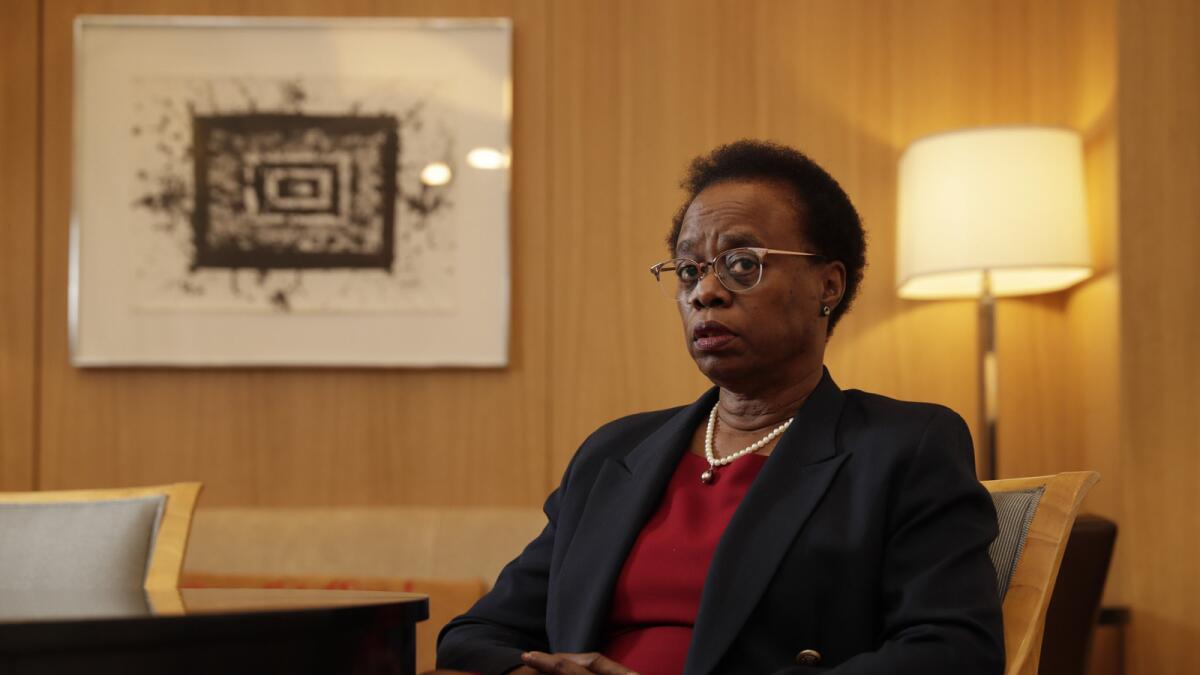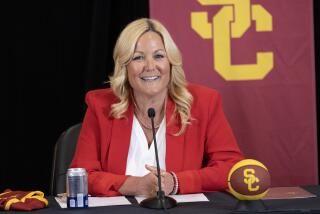USC’s tentative $215-million settlement in Tyndall abuse cases likely just the beginning of financial pain for the university

USC said Friday it had agreed to pay $215 million to former patients of Dr. George Tyndall, the first in what is expected to be a wave of payouts stemming from the sexual abuse scandal involving the longtime campus gynecologist.
The proposed settlement would provide $2,500 to any USC student treated by Tyndall during his three-decade tenure and up to $250,000 to those who allege they were abused by him. As many as 17,000 students and alumnae are eligible, a university lawyer said.
Wanda Austin, USC’s interim president, said in a letter to the campus community that through the settlement, “we hope that we can help our community move collectively toward reconciliation.”
Austin said in an interview that administrators have not estimated how much the Tyndall scandal will cost the university in the end as “there are still unknowns here.”
The deal applies only to a federal class-action lawsuit and does not automatically resolve more than 400 other patient suits playing out in Los Angeles Superior Court.
Lawyers in those local cases lambasted the settlement as paltry and premature, and promised to continue pursuing their cases. They said the class settlement did not allow for a full accounting of USC’s handling of Tyndall. The doctor was allowed to practice at the student health center for 27 years despite numerous complaints that began in the early 1990s.
“They want to shut it down, close the loop and end the inquiry on the documents showing who knew what — because it’s bad,” said John Manly, an Irvine-based attorney representing 180 of Tyndall’s former patients. “If you are in favor of secrecy about sexual assault and in favor of protecting sexual abusers, this is a great day for you.”
COMPLETE COVERAGE: USC former gynecologist Dr. George Tyndall accused of inappropriate behavior »
Tyndall has denied any wrongdoing. His attorney, Leonard Levine, has said that his client “continues to maintain that he engaged in no criminal conduct and that his medical examinations were always within the standard of care.”
The settlement was negotiated in recent months between three law firms representing patients, USC lawyers and an attorney for Tyndall. U.S. District Judge Stephen V. Wilson must sign off on the deal in order for it to take effect. The money for the settlement would come from the university’s insurers and what Austin described as “capital reserves.”
“While we cannot change the past, it is my sincere hope that this timely settlement provides some measure of relief to those impacted and their families,” said Rick Caruso, chairman of USC’s board of trustees, in a letter to alumni.
USC’s legal team anticipates the agreement will attract many women who have not filed lawsuits to share in the $215 million, said Tara Lee, an attorney for USC with Quinn Emanuel Urquhart and Sullivan.
“Our hope is it would encompass as many former patients as possible,” she said.
Austin told The Times on Friday that it was important to her to include all women treated by Tyndall, rather than only those who alleged abuse, so that women who might be too intimidated to file a police report or a lawsuit could receive fair compensation.
“It provides privacy and certainty for how this is addressed,” Austin said.
Former patients contacted by The Times said they had quickly decided not to participate in the settlement.
Alexis Rodriguez, who complained to USC administrators about Tyndall in 1995, said she would press ahead with the suit she filed through her attorney, Gloria Allred.
“Two hundred and fifteen million dollars for USC for nearly 30 years of wrongdoing doesn’t sound equitable to me,” said Rodriguez, a federal probation officer.
In May, Michigan State University reached a $500-million settlement with 332 women and girls who say they were sexually assaulted by sports doctor Larry Nassar.
Penn State has paid out more than $100 million in sexual abuse cases involving assistant football coach Jerry Sandusky.
The USC class-action settlement’s $250,000 cap roiled plaintiffs’ attorneys. Mike Arias, who represents about 80 women in state court cases, said he had a number of clients — “very prominent people” — who suffered damages far in excess of that amount.
“You are going to have a lot of people opt out of this settlement, I will guarantee that,” Arias said.
Other critics objected to how the settlement forestalled the taking of sworn testimony and exchange of records, a process that can reveal damaging evidence about institutional failures.
Manhattan Beach lawyer John Taylor, whose firm represents about 100 state court plaintiffs, said that while he was pleased USC had acknowledged wrongdoing, he planned to push forward with depositions of university administrators and requests to review internal school records.
“We are still trying to figure out the coverup and how it went on for so long,” he said.
Annika Martin, an attorney for Tyndall patients who helped negotiate the class-action settlement, defended the deal, saying it offered security and avoided the potential trauma of testifying.
“Whenever you litigate, there’s a risk. And, sure, you could have come up with a verdict of more than $250,000, but you could have come up with a jury verdict of zero,” said Martin. In the settlement, she said, “You know what you are going to get, and you know the process to get it.”
Speaking shortly after the settlement announcement, Austin described first learning of Tyndall near the end of 2017, when she and fellow university trustees were briefed by then-President C.L. Max Nikias and his advisors.
Tyndall had left the university the previous summer under a secret deal that included a financial payout. His departure followed an internal investigation into allegations of sexual harassment and racially inappropriate remarks.
When Nikias informed the board about Tyndall, Austin recalled, the emphasis was on his racial comments and “all the governance processes were working correctly.”
“I don’t think anybody understood fully the magnitude of it at that time,” she said.
Following the publication of The Times’ story, she said, she came to see that the real issue was inappropriate touching of patients’ genitals and suggestive remarks during exams.
“The realization it was about the gynecology … you are looking at a different problem,” Austin said.
Fury among USC faculty led Nikias to step down, and a search for a successor is underway. Austin, a longtime aerospace executive and alumna, took control of the university on a temporary basis in August. Since then, she said, she has talked to many former patients and parents of patients, and being a woman as well as a mother and a grandmother helped her grasp the scope of the problem.
Austin noted that USC’s student health clinic has been overhauled since Tyndall left and touted a new university office dedicated to investigating misconduct and promoting sound ethics.
“We have bright, smart people and are very dedicated to doing the right thing,” Austin said.
Asked why many of the administrators who handled Tyndall remained in their posts, and in some cases had been given more responsibilities, Austin indicated that she was waiting for the results of an internal investigation by law firm O’Melveny & Myers commissioned by trustees.
When it is is concluded at the end of the year, she said, “we will respond.”
An LAPD investigation into Tyndall’s conduct in medical exams is ongoing, and detectives have presented 64 cases to sex-crimes prosecutors. The Los Angeles County district attorney’s office is evaluating the cases.
No charges have been filed against the doctor.
UPDATES:
2:40 p.m.: This article was updated throughout.
12:30 p.m. The article was updated with more reaction.
10:50 a.m.: This article was updated with additional details about the proposed settlement and background information.
10:15 a.m.: This article was updated with comment from USC attorney Tara Lee.
This article was originally published at 9:40 a.m.
More to Read
Sign up for Essential California
The most important California stories and recommendations in your inbox every morning.
You may occasionally receive promotional content from the Los Angeles Times.












